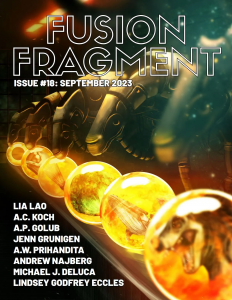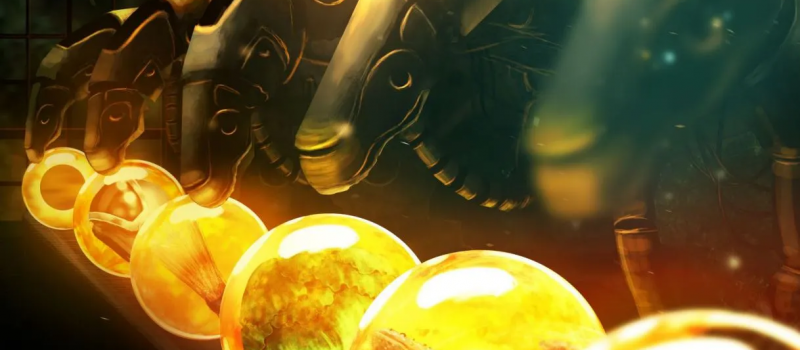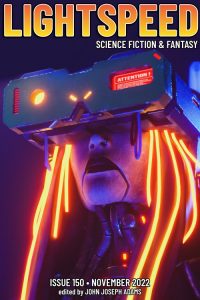Charles Payseur Reviews Short Fiction: Beneath Ceaseless Skies, Fusion Fragment, and Fantasy
 Beneath Ceaseless Skies 9/7/23, 9/21/23
Beneath Ceaseless Skies 9/7/23, 9/21/23
Fusion Fragment 9/23
Fantasy 9/23
September’s Beneath Ceaseless Skies covered a lot of ground, with its first issue focusing on young people fleeing violent and murderous men. In “Little Red Hands” by Jonathan Louis Duckworth, that comes in the form of Loaf, a young man running from a dark and bloody past, hoping to escape what’s behind him. It’s not easy, though, even when he finds a place that might accept him, with a woman, Ree, who seems to have grim secrets of her own. And yet across the divide of their sins, the two find something growing between them, something warm and fragile and wonderful. Something almost shattered when Loaf’s past comes walking to the door. The piece manages a palpable tension, all the characters aware that there is no real freedom from the past. But that doesn’t mean it can’t be faced, can’t be reckoned with, and Duckworth shows how that can work for two deeply imperfect people who still manage to find something strange and beautiful together. In the month’s second issue, focus shifts to stories of immigration and godlike powers, as in Kaitlyn Zivanovich’s “Where the River Comes From”, which follows Rviv, a girl born in a country of exile for her family. Brought up between cultures, between gods, she struggles to find a way to fit in and belong – pulled by the traditions of her family and the home that for her is the only one she’s ever known. Her only moments of true belonging seem to come in the company of a god she meets at a private spring, where she can finally let go of her fear and loneliness and just be. When her family’s exile is lifted, though, and she must face leaving the place she was growing to deeply appreciate for a new place she still can’t belong to, she’s left wondering where is right for her, and what gods could truly understand her situation. Zivanovich engages with a complex and messy subject, but does so with care and empathy. The result is a story that challenges what home can be, and finds gods even for those caught perpetually between places and identities. It’s great.
The September Fusion Fragment returns again and again to destruction, extinction, and the death of worlds and stars. A number of the works deal with various apocalyptic events, but perhaps none with more tragedy than A.C. Koch’s stunning “From Chixculub with Love”, which finds a crew on the Moon trying to help Earth’s last hope following the presumed complete destruction of human civilization on the planet. Luckily, a ship designed to seek out a new home for humans was already in orbit and mostly full of people. Unluckily, there’s no way for the crew on the Moon to join that ship, and so they’re left just trying to help it leave safely. For the leader of the crew, that means waving goodbye to her husband, who is the ship’s captain. Koch does a wonderful job showing the impassable distance between the crew on the Moon and the people on the ship, and the way they all come to terms with what has happened, and what will happen. It’s melancholy and wrenching, and it makes for an emotionally devastating read. A.W. Prihandita’s “To Fall in Love with a Dying Sun” shifts the scale of destruction from the planetary to the stellar in a world where iterations of the stars come down to Earth when they begin to decline, and live out the last of their years as humans. Cariana has lived for over a millennium, but her time is running out, and when she meets Levi at a celebration of her final year of existence, it’s the beginning of something doomed… but also something vibrant and alive and deeply important to them both. Prihandita does some fascinating and careful worldbuilding, and finds in Levi and Cariana two very different perspectives on mortality, but two that complete each other, and lead to a deep and profound statement on life, love, and the cosmos.
And finally, the September Fantasy marks the penultimate issue of the publication (barring another future relaunch) and features some great works, including “Bacá” by Alex V. Cruz, which looks at exploitation, fear, and hatred. The narrator is queer and part of a people being forced off their land, their ownership erased, their rights denied in the face of the profits to be made off foreign tourists. In order to expedite the theft, a beast has been released to prey on the narrator’s people, and yet the narrator himself seems to have more to fear from his own people, who would kill him for his desires. Which ends up making his particular options rather limited… and bloody. Cruz does strong work setting up this complex and wrenching situation, and caps it off with a sharp and clever framing twist at the end, reminding readers that luxury tourism catering to the wealthy is an industry often built on graves and land soaked in misery. In the issue’s poetry, Oluwatomiwa Ajeigbe’s “The Mortal’s Guide to Attaining Godhood in the Era of Chaos” confronts change and cycles of power, freedom, and destruction. It follows a narrator who does not accept what the gods have in store for them and rebels, learning the power of the gods and replacing them. Just as it was possible for them to accomplish the feat, though, the poem explores how the narrator falls into the same role they initially fought so hard against, and once they are entrenched in their godhood, others might be able to follow suit. In some ways the piece is about conflict in a time where thinking that far ahead isn’t always possible, where the need to survive and find a kind of freedom can hide that in the Era of Chaos, that too can become a cage. Ajeigbe does solid work in showing what might be futility, but what might also be the only way people can fully express themselves when everything is broken and ravaged.
Recommended Stories:
“To Fall in Love with a Dying Sun”, A.W. Prihandita (Fusion Fragment 9/23)
“Bacá”, Alex V. Cruz (Fantasy 9/23)
Charles Payseur is an avid reader, writer, and reviewer of speculative fiction. His works have appeared in The Best American Science Fiction and Fantasy, Lightspeed Magazine, and Beneath Ceaseless Skies, among others, and many are included in his debut collection, The Burning Day and Other Strange Stories (Lethe Press 2021). He is the series editor of We’re Here: The Best Queer Speculative Fiction (Neon Hemlock Press) and a multiple-time Hugo and Ignyte Award finalist for his work at Quick Sip Reviews. When not drunkenly discussing Goosebumps, X-Men comic books, and his cats on his Patreon (/quicksipreviews) and Twitter (@ClowderofTwo), he can probably found raising a beer with his husband, Matt, in their home in Eau Claire, Wisconsin.
This review and more like it in the November 2023 issue of Locus.
 While you are here, please take a moment to support Locus with a one-time or recurring donation. We rely on reader donations to keep the magazine and site going, and would like to keep the site paywall free, but WE NEED YOUR FINANCIAL SUPPORT to continue quality coverage of the science fiction and fantasy field.
While you are here, please take a moment to support Locus with a one-time or recurring donation. We rely on reader donations to keep the magazine and site going, and would like to keep the site paywall free, but WE NEED YOUR FINANCIAL SUPPORT to continue quality coverage of the science fiction and fantasy field.
©Locus Magazine. Copyrighted material may not be republished without permission of LSFF.






